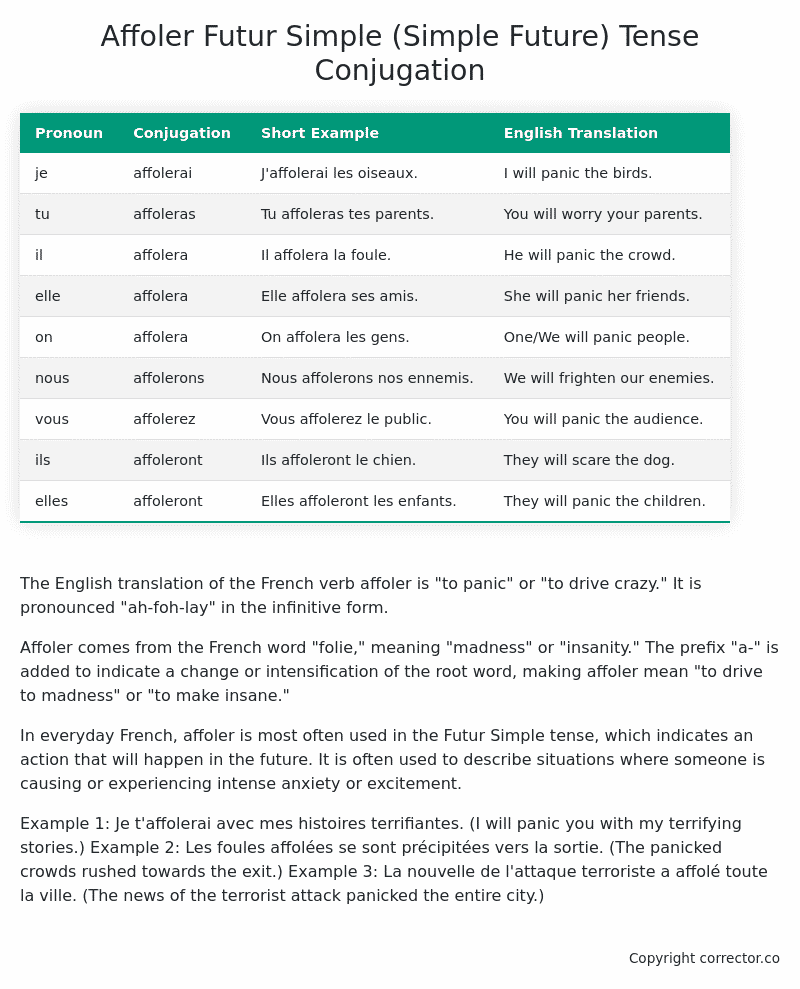Futur Simple (Simple Future) Tense Conjugation of the French Verb affoler
Introduction to the verb affoler
The English translation of the French verb affoler is “to panic” or “to drive crazy.” It is pronounced “ah-foh-lay” in the infinitive form.
Affoler comes from the French word “folie,” meaning “madness” or “insanity.” The prefix “a-” is added to indicate a change or intensification of the root word, making affoler mean “to drive to madness” or “to make insane.”
In everyday French, affoler is most often used in the Futur Simple tense, which indicates an action that will happen in the future. It is often used to describe situations where someone is causing or experiencing intense anxiety or excitement.
Example 1: Je t’affolerai avec mes histoires terrifiantes. (I will panic you with my terrifying stories.)
Example 2: Les foules affolées se sont précipitées vers la sortie. (The panicked crowds rushed towards the exit.)
Example 3: La nouvelle de l’attaque terroriste a affolé toute la ville. (The news of the terrorist attack panicked the entire city.)
Table of the Futur Simple (Simple Future) Tense Conjugation of affoler
| Pronoun | Conjugation | Short Example | English Translation |
|---|---|---|---|
| je | affolerai | J’affolerai les oiseaux. | I will panic the birds. |
| tu | affoleras | Tu affoleras tes parents. | You will worry your parents. |
| il | affolera | Il affolera la foule. | He will panic the crowd. |
| elle | affolera | Elle affolera ses amis. | She will panic her friends. |
| on | affolera | On affolera les gens. | One/We will panic people. |
| nous | affolerons | Nous affolerons nos ennemis. | We will frighten our enemies. |
| vous | affolerez | Vous affolerez le public. | You will panic the audience. |
| ils | affoleront | Ils affoleront le chien. | They will scare the dog. |
| elles | affoleront | Elles affoleront les enfants. | They will panic the children. |
Other Conjugations for Affoler.
Le Present (Present Tense) Conjugation of the French Verb affoler
Imparfait (Imperfect) Tense Conjugation of the French Verb affoler
Passé Simple (Simple Past) Tense Conjugation of the French Verb affoler
Passé Composé (Present Perfect) Tense Conjugation of the French Verb affoler
Futur Simple (Simple Future) Tense Conjugation of the French Verb affoler (this article)
Futur Proche (Near Future) Tense Conjugation of the French Verb affoler
Plus-que-parfait (Pluperfect) Tense Conjugation of the French Verb affoler
Passé Antérieur (Past Anterior) Tense Conjugation of the French Verb affoler
Futur Antérieur (Future Anterior) Tense Conjugation of the French Verb affoler
Subjonctif Présent (Subjunctive Present) Tense Conjugation of the French Verb affoler
Subjonctif Passé (Subjunctive Past) Tense Conjugation of the French Verb affoler
Subjonctif Imparfait (Subjunctive Imperfect) Tense Conjugation of the French Verb affoler
Subjonctif Plus-que-parfait (Subjunctive Pluperfect) Tense Conjugation of the French Verb affoler
Conditionnel Présent (Conditional Present) Tense Conjugation of the French Verb affoler
Conditionnel Passé (Conditional Past) Tense Conjugation of the French Verb affoler
L’impératif Présent (Imperative Present) Tense Conjugation of the French Verb affoler
L’infinitif Présent (Infinitive Present) Tense Conjugation of the French Verb affoler
Struggling with French verbs or the language in general? Why not use our free French Grammar Checker – no registration required!
Get a FREE Download Study Sheet of this Conjugation 🔥
Simply right click the image below, click “save image” and get your free reference for the affoler Futur Simple tense conjugation!

Affoler – About the French Futur Simple (Simple Future) Tense
Formation of Futur Simple
For regular -er verbs (e.g., parler – to speak)
For regular -ir verbs (e.g., finir – to finish)
For regular -re verbs (e.g., vendre – to sell)
Common Everyday Usage Patterns
Conditional Statements
Interactions with Other Tenses
Futur Antérieur
Conditional
Present
Summary
I hope you enjoyed this article on the verb affoler. Still in a learning mood? Check out another TOTALLY random French verb conjugation!


